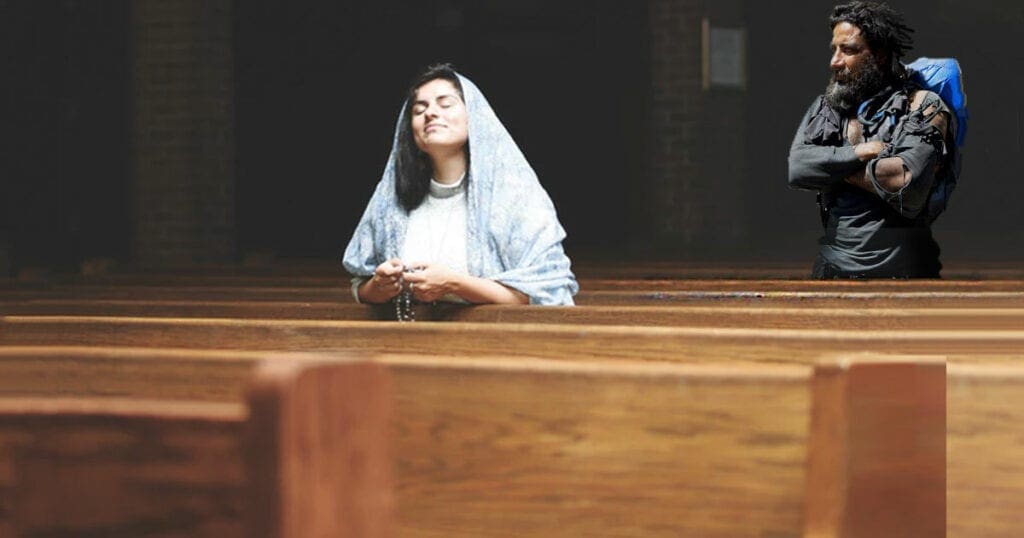Leave God for God?
Regular visitors to this site are familiar with St. Vincent de Paul’s counsel to “leave God for God.” If someone in need knocks at your door while praying you ought to leave God for God.
I must admit that in my early days of active ministry I missed the point. Too frequently, I invoked his words to justify skipping prayer to the point I hardly prayed. In my later years, I finally came to realize that knock as a call to prayerfully hold the body of Christ presented to me in my real world. The words are a call to pray in a different and more concrete way rather than skip prayer for ministry.

Many paths to prayer
In a recent reflection on “Many Paths to Contemplation,” Fr. Richard Rohr, OFM offers the following insight.
…the rather monastic, solitary, silent approach just can’t be adequate to describe contemplation for most people. It can’t be, or many of God’s children could never know God. Contemplation is simply openness to God’s loving presence in “what is” right in front of you— which is what I saw these parents do. This presence to Presence can be cultivated in many ways that don’t require sitting on a mat for twenty minutes.
Experiences of great love and great suffering can and will lead anyone to union. He continues…
Every time you let your kids pull love out of you or when you let a relationship pull suffering out of you, you are present and surrendering to the flow.
I think Catholics have also over-emphasized the celibate path which is a “luxury,” it seems to me. I know I enjoy that luxury— the Franciscans provide for all my needs, but most people I know have a mortgage or rent to pay and food to put on the table. So, I think it is really important that we broaden the definition of contemplation to a Trinitarian understanding of God— God as flow— and learning how to allow and participate in the flow. It’s not really about detachment but healthy and unitive attachment.
If we expect the same disciplined practice of twenty minutes of silence twice a day of everyone— for example, busy parents of young children— I think we’re setting ourselves up for delusion.
When you keep allowing love to flow toward you and toward others, that is a contemplative life. It is not as easy as it seems.
Many lay people are far more mature in the spiritual life than those of us who have all the accoutrements of celibacy, quiet, and protected solitude.
Those who have a long-term object of love, like a spouse or children, grow through their commitment.
…if you are a parent or a partner, you can’t go home and shut the door to your loved ones. For all of us— whether we live alone or with others— the invitation is to open ourselves to the needs and suffering around us, beginning with our nearest neighbor and radiating out to all the world and creation itself.
St. Vincent’s “real world” mysticism
Rohr reminds us of Parker Palmer’s wonderful, simple definition of contemplation: “Contemplation is any way one has of penetrating illusion and touching reality.”[1] Isn’t that what characterized the difference between the more ambitious young Vincent and the mature Vincent who taught us to see the person in front of us as the body of Christ today?
We speak now of St. Vincent as a mystic of charity. Mystics are people who see and love the world as God sees and loves the world.
Vincent saw the illusion of our separateness from one another.
Vincent understood the words of Isaiah, “He was spurned and avoided by men, a man of suffering, knowing pain, like one from whom you turn your face, spurned, and we held him in no esteem.” (Is 53:3)
Vincent understood why Jesus presented himself as the “suffering servant.”
Vincent touched the reality of the broken body of Christ.
Questions
- Am I waiting for the perfect time and place to pray?
- Am I open to God’s real presence in the world as I experience it?
- Does this reflection shed any light on Blessed Rosalie Rendu’s oft-quoted statement “Never have I prayed so well as in the streets”?
[1] Parker Palmer, On the Brink of Everything: Grace, Gravity and Getting Old (Berrett-Koehler Publishers, Inc.: 2018), 57.
If this post struck a chord, visit a week of reflection by Richard Rohr unpacking the theme of “Many Paths to Contemplation” beginning the week of June 23, 2019.






Moments after this was published I saw the following post with the words
“A friend of mine often says that our real mission is the interruption, that everything else is just work. I find that beautiful and inspiring, but not easy and certainly not practical! Could it be true, though?”
https://www.globalsistersreport.org/column/horizons/spirituality/interruptions-reveal-our-true-mission-56293“